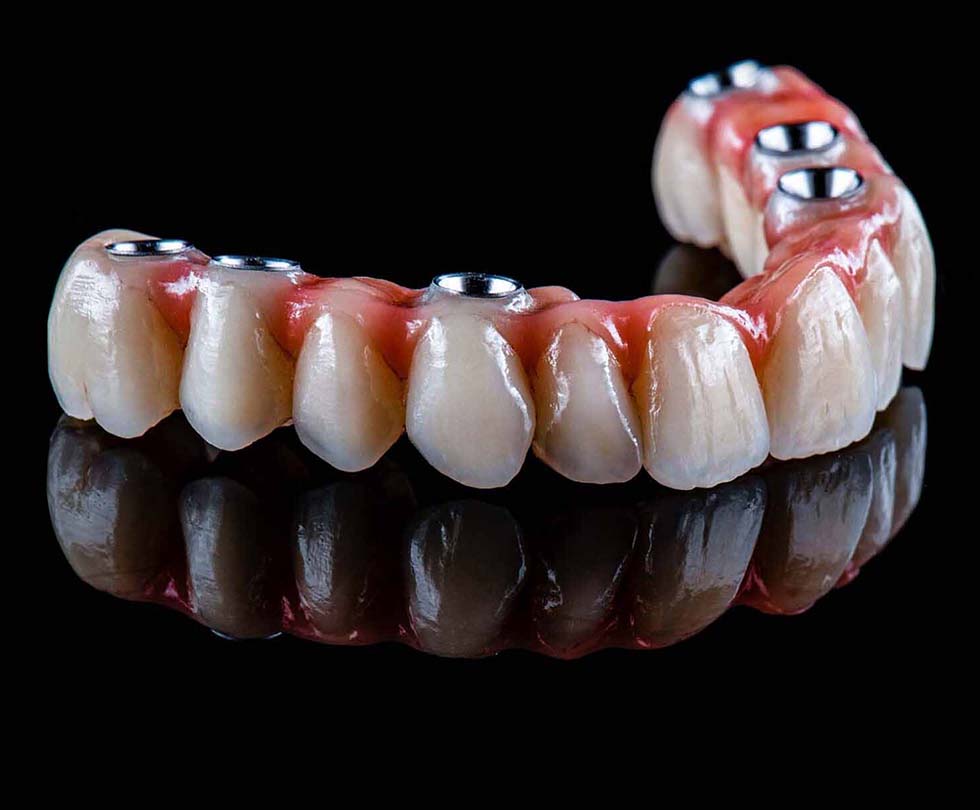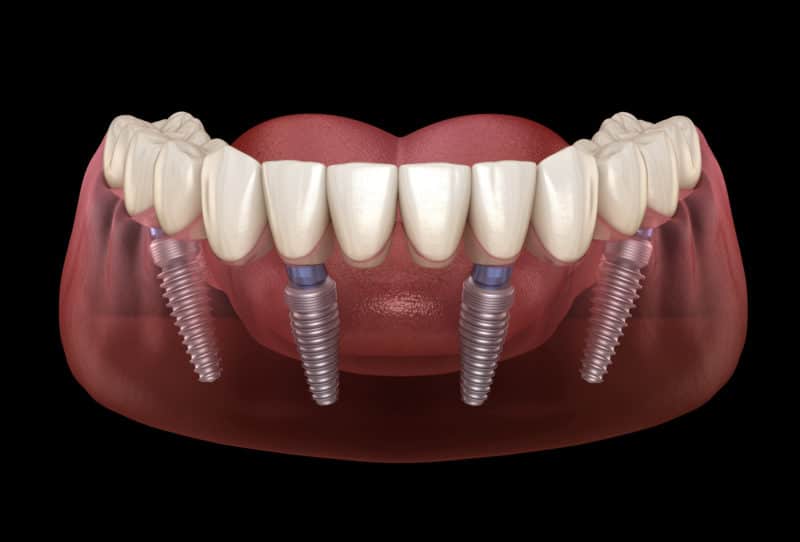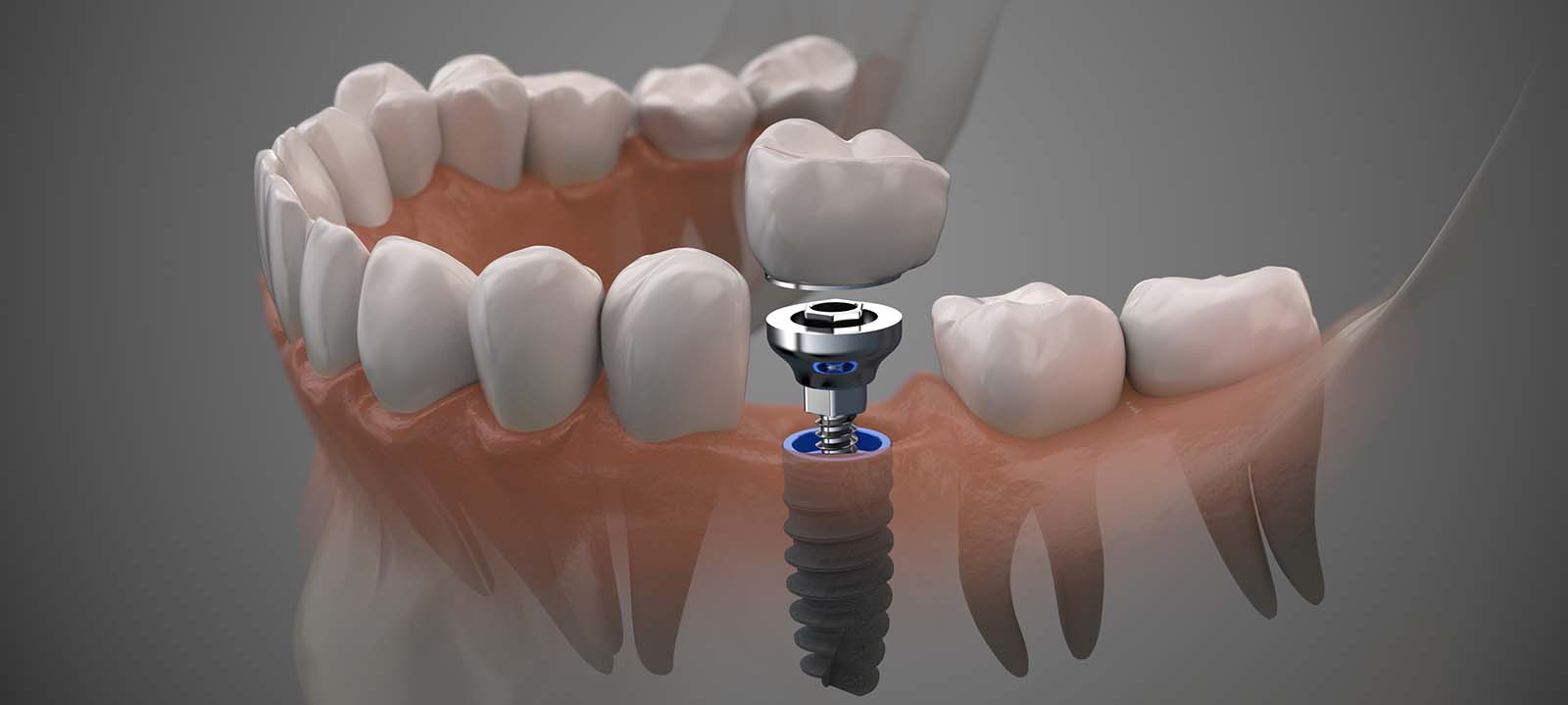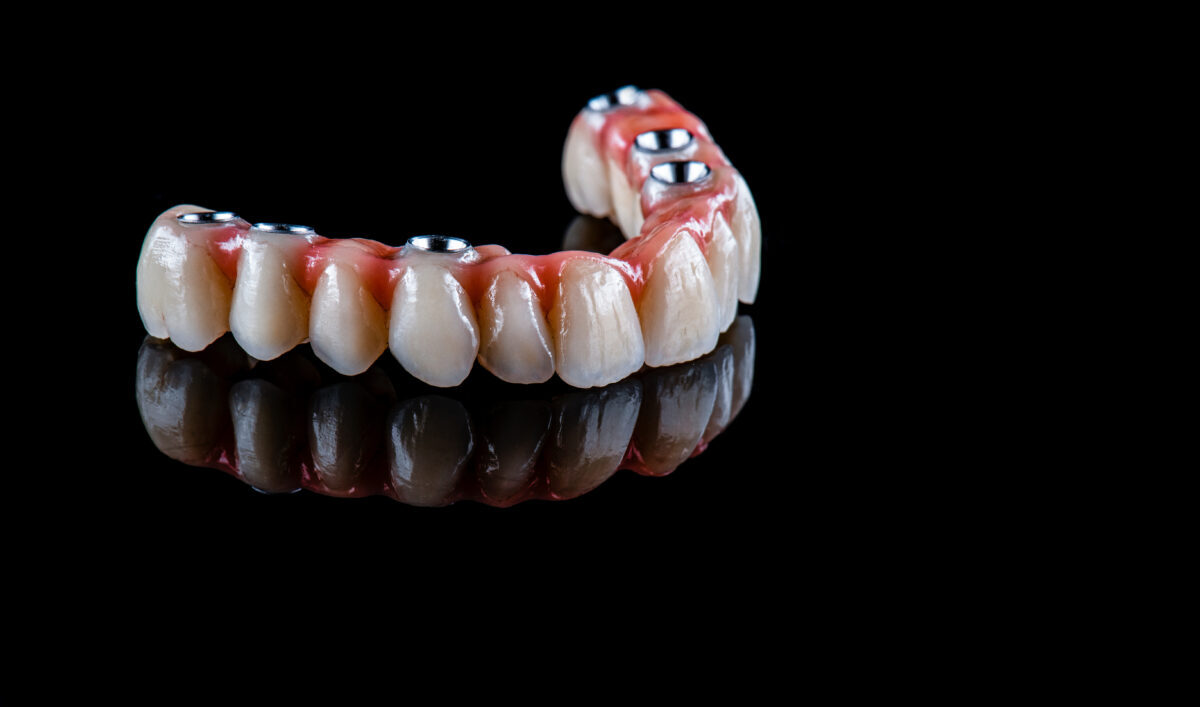Dental implants are a popular and effective way to replace missing teeth. However, they are not right for everyone.
When considering dental implants, it is important to have all the facts before deciding. The following are some frequently asked questions about dental implants that can help you learn more about this treatment option.
What are dental implants?
The most basic dental implants faqs you may ask is what dental implants are! Dental implants are artificial tooth roots that we place into the jawbone to support a dental prosthetic. The implant is a product of titanium, a biocompatible metal that will fuse with the bone over time.
Once the implant has bonded with the bone, we place an abutment on top of it. The abutment is a connector piece that will hold the dental prosthetic.
We use a dental crown when there is only one missing tooth and a denture when there are several missing teeth. Dental implants are a safe and effective way to replace missing teeth and can improve both the function and appearance of your smile.
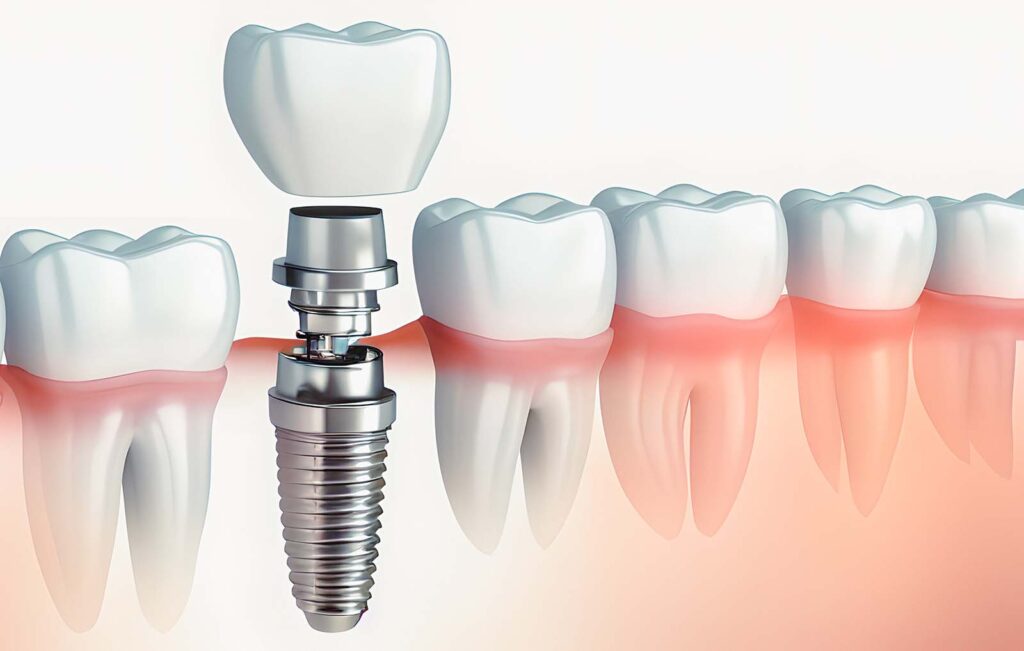
Who is a good candidate for dental implants?
Dental implants are a popular tooth replacement option for many people. In order to be a good candidate for dental implants, you need to have healthy gums and sufficient bone mass to support the implants.
You must also be committed to oral hygiene, as implants require careful brushing and flossing to avoid gum disease.
In addition, you should be in good overall health, as certain medical conditions can increase the risk of complications from dental implants. If you are considering dental implants, talk to your dentist to see if they are right for you.
Learn more who is a good candidate for dental implants.
What are the benefits of dental implants?
Dental implants are a popular solution for missing teeth, and for a good reason. Unlike other options, such as dentures or bridges, dental implants are permanently anchored in the jawbone, providing a strong and stable foundation for replacement teeth.
In addition, dental implants can help to preserve bone density in the jaw and prevent gum deterioration. Additionally, they allow patients to eat and speak confidently, knowing that their teeth will stay securely.
And because they look and feel just like natural teeth, dental implants can also help to restore a patient’s smile. With all of these benefits, it’s no wonder that dental implants are such a popular choice for those seeking to improve their oral health.
See: Dental Implants Benefits You didn’t know.
What are the risks of dental implant surgery?
One of the most common complications is an infection at the implant site. This can happen if bacteria from the mouth enter the implant site during surgery. Infection can also occur if plaque builds up around the implant, causing it to become irritated and inflamed.
In rare cases, the infection can lead to bone loss and eventually cause the implant to fail. Another risk of dental implant surgery is nerve damage. This can happen if the nerves near the implant site are damaged during surgery.
Nerve damage can cause numbness, tingling, or pain in the mouth or jaw. In rare cases, it can also lead to paralysis of the muscles in the face. Finally, there is a small risk of allergic reaction to the materials used in dental implants. These reactions are usually mild and can be treated with oral or topical antihistamines.
See: Are Dental Implants Safe?
How much do implants cost, and can insurance cover the expenses?
In terms of cost, dental implants typically range from $1,000 to $3,000 per tooth. Some insurance plans may cover a portion of the cost, but it is important to check with your provider to see if they offer any coverage for implants.
For cosmetic procedures, patients will usually need to pay the full cost out-of-pocket. There are a few financing options available to help make implants more affordable, such as loans and payment plans.
See Also: Dental Implants Cost in Los Angeles
What is the success rate?
The success rate of dental implants is high, with a success rate of over 95% for both upper and lower jaw implants. However, there are a few factors that can affect the success of dental implants, such as smoking, diabetes, and periodontal disease.
In addition, the type of implant used can also affect the success rate. For example, endosteal implants implanted into the jawbone have a higher success rate than subperiosteal implants, which sit on top of the jawbone.
See also: Dental Implants Success Rate
Do dental implants have a lifespan?
The answer, unfortunately, is not as straightforward as we would like. While dental implants can last a lifetime, several factors can affect their longevity. The health of the patient’s mouth, for example, is crucial to the success of the implant.
Those with gum disease or who do not properly care for their teeth are at greater risk for implant failure. In addition, the quality of the implant itself is an important factor.
Finally, the skill of the implanting dentist is also a key consideration. Dentists with less experience with implant surgery are more likely to make mistakes that can lead to implant failure.
See Also: Dental Implants Timeline
What if I’m looking for a non-metallic implant?
Metal-free implants are products of ceramic or plastic materials. Metal-free implants may be a good choice for people who want to avoid having metal in their bodies. Ceramic implants are strong, durable, and less likely to break than plastic implants.
However, they are more expensive than metal implants. Plastic implants are not as strong as ceramic or metal implants but are less likely to break than ceramic implants. Plastic implants are also less expensive than ceramic or metal implants.
What exactly is All-on-4®?
All-on-4® is a dental implant procedure that can provide patients with a full set of new teeth in just one day. The procedure involves placing four implants into the jawbone, which act as anchors for a full set of artificial teeth.
All-on-4® is an ideal solution for patients who have lost all of their natural teeth, as well as for those who are facing extractions due to advanced periodontal disease. We place implants in strategic positions in the jawbone, which helps to maximize stability and support for the new teeth.
See Also: Where to get All on 4 in Los Angeles
Is it possible to convert dentures into implants?
Dentures are typically acrylic and fit over the gums, providing artificial teeth that look and function relatively well. However, dentures can sometimes be uncomfortable and inconvenient, needing to be replaced every five to seven years.
For some people, implants may be a better option. Dental implants are titanium posts surgically implanted into the jawbone, providing a solid foundation for artificial teeth. They are more expensive than dentures but can last a lifetime with proper care.
See Also: Dental Implants vs. Dentures
Is it possible for any dentist to accommodate my dental implant?
Many people are unaware of the significant difference between a general dentist and an oral surgeon. An oral surgeon is a medical doctor specializing in surgical procedures of the mouth, including dental implants.
General dentists are not licensed to perform surgery and, therefore, cannot place dental implants. Our oral surgeons have received specialized training in implantology and are better equipped to handle potential complications.
See Also: Why See a Periodontist for dental implants
How long does it take to replace teeth using dental implants?
The process of getting a dental implant usually takes several months. The first step is to have a metal anchor surgically implanted into the jawbone. This anchor will serve as the foundation for the artificial tooth.
Once the anchor is in place, it will take several weeks to heal and fuse with the bone. Once this fusion is complete, the next step is to attach a post to the anchor. This post will protrude from the gums and support the artificial tooth. The final step is to attach the artificial tooth to the post.
In most cases, we can do this in a single office visit. However, in some cases, multiple visits may be necessary. Overall, the entire process of getting a dental implant usually takes several months.
How much do dental implants cost in Los Angeles?
The cost of dental implants can vary depending on the type of implant you choose and the number of implants needed. The average cost for a single dental implant in Los Angeles is $3,000. However this cost varies depending on where you go and the treatments you may need such as bone graft. Contact Southland Dental Care for your dental consultation and cost estimate.
See Also: Dental Implants Cost
Can I get dental implants for $399?
Dental implants are a great way to restore your smile, but they can be costly. The average cost of dental implants is around $3,000 per tooth. However, there are many ways to save on dental implants, including discounts and financing options.
It’s important to remember that the cost of dental implants will vary depending on the type of implant you choose, the number of implants you need, and the complexity of your case. As such, it’s best to consult a qualified dentist to estimate the total cost of your treatment.
See Also: $399 Dental Implants
What is all on 4 dental implants?
All on 4 dental implants are a type of dental implant that we use to support an entire denture or bridge.
Unlike traditional implants, which require a separate implant for each tooth, all 4 dental implants use just four implants placed in the jawbone to support an entire arch of teeth. All on 4 dental implants are often used as an alternative to dentures, providing a more secure and stable fit.
What is all on 6?
All on 6 is a type of dental implant that uses six implants to support a full arch of teeth. It is an effective and popular treatment option for people who have lost most or all of their teeth. The all-on-6 system can give you a brand new smile that looks and feels natural.
See Also: All on 6 dental Implants in Los Angeles
What does the procedure look like for getting dental implants?
The process of getting dental implants usually involves a few steps:
First, your dentist will assess your mouth to ensure you are a good candidate for dental implants. It includes looking at the health of your gums and jawbone. Next, the dentist will place the implant into your jawbone.
Once the implant has fused to your jawbone, our dentist will place a connector piece, called an abutment, onto the implant. Finally, our dentist will place a dental prosthetic false tooth onto the abutment.
How effective are dental implants?
Dental implants are a very effective way to replace missing teeth. In fact, they are often considered to be the best option for replacing missing teeth. They are also very strong and durable and can last for many years with proper care.
Does it hurt?
No, the procedure is generally pain-free. We use local anesthesia to numb the area, so you won’t feel any discomfort.
See Also: Do dental implants hurt?
Can I get same-day dental implants?
Yes, you can get dental implants on the same day as your consultation. However, this depends on a few factors, such as the type of implant you need, the number of implants you need, and the severity of your tooth damage.
You should also have healthy gums and bones to support the implants. If you are missing teeth, have suffered bone loss, or have other health conditions that could jeopardize the success of your surgery, you may not be a candidate for same-day implants.
See Also: Same Day dental Implants in Los Angeles
Who is the best dental implant surgeon in Los Angeles?
There are several excellent dental implant surgeons in Los Angeles. Dr. Delaram Hanookai, on the other hand, is one of the greatest dental implant surgeon in Los Angeles.
See Also: Best Dental Implants Surgeon in Los Angeles
Is smoking allowed post dental implant surgery?
We don’t advise smoking after surgery, but it is especially important to refrain from smoking after dental implant surgery. Smoking can delay healing and increase the risk for complications following surgery. If you must smoke, it is best to wait at least two weeks before resuming.
See Also: Smoking After Tooth Extraction
What food can I eat after dental implant surgery?
You should avoid hard, crunchy, or sticky foods for at least two weeks. Cut your food into small pieces and chew slowly and carefully. Eating soft foods like soup, applesauce, and mashed potatoes will be easier on your teeth and gums while they heal.
How to care for my dental implants?
To ensure that your dental implants last for many years, it is important to take good care of them. Just like natural teeth, you should brush and floss your implants daily. In addition, it is important to see your dentist or oral surgeon regularly for checkups and cleanings.
See Also: How to care for dental Implants
Will my insurance cover the procedure?
You will have to check with your insurance provider. Usually, your dental insurance will not cover your dental implants. Because the surgical procedure is becoming more common, some insurance companies have decided to cover some parts of the procedure. The only way to know for sure is to contact your insurance provider and ask about your dental insurance coverage. Make sure to do this before you decide to go through the procedure.
What are the cons of getting dental implants?
Getting dental implants may cause you to have more than one procedure. If you have a thin jaw bone, there won’t be enough bone to anchor the dental implant in your mouth. If it is not anchored properly, then it could make chewing very difficult. This means that in order to get the dental implant, you will have to get a sinus lift, wait for 5 to 10 months for the bone graft to graft properly and then get the dental implant.
Just like with any surgery, there are drawbacks. For most oral surgeries, there is always a chance of infection and inflammation, and some pain. This is rare, but it can still happen so you should speak to your dentist about any problems you are having after the implant.
What are the pros of dental implants?
A beautiful smile does wonders for a person’s confidence. Whether you have lost your teeth due to decay, an accident, or gum disease, dental implants can help you get your confidence back. The implants can last for a long time, and they don’t decay. They will approve your appearance, and you can get back to eating the foods you love.
Talk To Us!
If you’re considering dental implants, we’d be happy to provide you with a consultation. During your consultation, we will assess your individual needs and determine whether or not dental implants are the best solution for you. We’ll also go over the cost of treatment and answer any questions you may have.
To schedule a consultation, contact us. We look forward to helping you achieve a beautiful, healthy smile!









